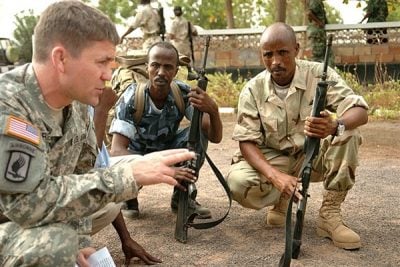U.S. Out of Africa: U.S. Imperialism in Somalia

All Global Research articles can be read in 51 languages by activating the “Translate Website” drop down menu on the top banner of our home page (Desktop version).
Visit and follow us on Instagram at @crg_globalresearch.
***
The US Africa Command confirmed that it carried out its third airstrike allegedly against an Islamic resistance movement in less than two weeks. The airstrikes took place on August 1, July 23, and July 20. This is a continuation of the broader shadow war on Somalia in which the U.S. conducted 63 strikes in 2020.
The U.S. mainstream media and politicians blame the U.S. shadow war in Somalia on Al-Shabaab, an Islamist insurgent group that controls much of southern Somalia, but the main culprit is the United States government that led a military invasion of the country from 1992 to 93 in a nefariously dubbed Operation Restore Hope. Ever since, Somalia has been in a perpetual state of war, and the U.S. has continued with destabilization efforts since 1992.
Somalia’s only hope for sustainable peace and development lies within the national unity of its people absent the tutelage of the US.
AFRICOM Watch Bulletin talks with Farid Abdi Mohamed Omar, a long-time radio journalist, a conflict analyst, peace researcher, and an international writer on politics, sports, and lifestyle. Farid is a recipient of the prestigious international scholarly award — the Golden Key International Honour Society Award and the New Pioneers Award. The University of Toronto named Farid the Silcox Scholar in Public Administration.
*
AFRICOM Watch Bulletin: Would you be able to give some historical context to U.S. imperialism in Somalia?
Farid Abdi Mohamed Omar: Somalia has endured a long history of imperialism both at the hands of European colonial powers and the U.S. But the Somali people have always demonstrated their strong determination to resist Western imperialism, and, in 1960, European colonizers were eventually defeated when Somalia attained its national independence.
In the early 1980s, U.S. imperialism gradually took hold in Somalia as the U.S. administration propped up the Barre military dictatorship through financial aid and the massive transfer of arms.
Working in collusion with Barre, U.S. destabilization in this era was aimed at suppressing and dividing the Somali people, thereby making Washington directly responsible for state collapse in Somalia.
AWB: Can you speak to the end of the Islamic Courts Union?
FO: Towards the end of 2006, U.S.-backed Ethiopian forces, with the direct support of American air power, rolled into Somalia to oust the Union of Islamic Courts, of which Al Shabaab was a key member, that had restored peace and security in much of southern Somalia during their brief reign of power. The illegal invasion and occupation of Somalia installed a puppet war-lord regime, marking a new phase of U.S. imperialism in Somalia, plunging the war-torn nation into further anarchy.
It is also part of a U.S. militarist agenda meant to complete the unfinished business of the so-called “Operation Restore Hope,” which went up in smoke in 1993 when nationalist forces defeated and humiliated U.S. forces that occupied Somalia.
AWB: What is appealing about Somalia for U.S. imperialism?
FO: The primary objective of the U.S. hegemonic designs in Somalia is the unfettered access to Somalia’s untapped but massive oil reserves and vast uranium deposits. In geopolitical terms, Somalia is strategically located because it lies at the confluence where the Indian Ocean, the Gulf of Aden, and the Red Sea converge. It oversees the daily passage of oil tankers that go through the Suez Canal while its close proximity to the Middle East and Sudan makes it ideal for the U.S. to launch military strikes against a perceived “Islamist threat” in the region.
Worse still, the U.S. planned to use the strategic City of Berbera as the base of its newly launched AFRICOM (Africa Command), a Pentagon-orchestrated scheme aimed at completing the militarization of the entire African continent.
AWB: How have the Somali people resisted?
FO: Just as the Somali people rallied to defeat U.S. imperialism in 1993, Somali resistance against the ongoing occupation will stop at nothing short of stamping out the remaining vestiges of imperialism
As well, the Somali Diaspora has stepped up its peaceful resistance to U.S. imperialism, and this is evident in the recent well-attended Somalia Peace rallies organized by the Somali Canadian Diaspora Alliance (SDA). The SDA has also built alliances with like-minded organizations and other solidarity groups fighting against war and occupation in other parts of the world.
In fighting the occupation, and by forging ahead to rebuild a united, peaceful Somalia, an umbrella organization bringing together eight progressive Somali Diaspora organizations from both Canada and the United States was formed in November during a major conference held in Virginia.
The mandate of the new organization known as Somali Cause, is to demand an immediate end to the Ethiopian occupation and rampant war crimes, promote an all-inclusive national reconciliation process, and call for the establishment of an International War Crimes Tribunal for Somalia.
The main objective is to forge a united front to peacefully free Somalia from occupation and oppression, and to bring lasting freedom and democracy to the Somali people.
AWB: Thank you for your time and analysis!
*
Note to readers: Please click the share buttons above or below. Follow us on Instagram, @crg_globalresearch. Forward this article to your email lists. Crosspost on your blog site, internet forums. etc.

